- Home
- Al Sarrantonio
Kitt Peak Page 3
Kitt Peak Read online
Page 3
"Excuse me," Thomas said.
"No mas," the cook said, not looking at him. In Spanish, Thomas asked if the cook had told Mr. Cates he was here.
The cook ignored him, then seemed to sense his growing anger. Holding his knife a little tighter while he chopped, he finally said, "I tot' him, he said to make you go away."
"You tell Mr. Cates — " Thomas began, but then a large white man, in whiskers, with the jolly demeanor of a barkeep, was filling the doorway, and looking at Thomas.
"You can tell me yourself," he said gruffly. Then he turned away, into a side pantry, and waited for Thomas to follow.
The pantry proved to be larger than it looked from the street. Between the shelves of canned and jarred goods was a small desk covered with invoices, with a chair behind it. Thomas noted an Abercrombie and Fitch catalog on the desk, which Cates pushed aside. Cates sat down in the chair. There was nowhere else in the room to sit.
"As soon as I told Miguel to make you disappear, I knew it was a mistake," he said. Before Thomas could attempt to thank him, he continued, "From what Bill Adams told me, you were a pushy little bulldog, and wouldn't take no for an answer."
Again Thomas tried to open his mouth, but Cates rolled on.
"I should apologize for not answering that second telegram of yours. But I saw no need to. Figured you were smart enough to figure the story out and didn't need no a second time." Cates sighed. "I was wrong."
This time. Thomas didn't even try to speak.
"You've got to realize something, Mullin. The Bill Adams I knew, and the one you knew, were two different people. Adams was a major drinker by the end, and half the time he didn't know what he was telling and who he was telling it to.
"I was in the Army, too, Fort Collins up in Wyoming. Which is why I'm being so civil. I understand you made it to lieutenant. That's quite an achievement, for your race. I can't say I ever knew even a Mexican made it that far, never mind one of you people. I also hear you knew Grierson, back in Washington, which couldn't have hurt."
For the first time, Cates bothered to look straight at Thomas, and Thomas saw just how hard his face was behind the jovial whiskers.
"This ain't the army, and you ain't a lieutenant anymore," he said. "And I thought even a smart darkie like you're supposed to be would figure out you're not wanted in Tucson."
Holding his temper, Thomas said evenly, "If you'll just tell me where Bill Adams was heading, I'll be on my way."
Cates rose slowly to his full height and walked around the desk. He brought his face close to Thomas's and said angrily, "Maybe I didn't make myself clear —
"Trouble, Dexter?" came a mild voice from the doorway.
They both turned to face a tall, thin man leaning on the doorjamb leading into the pan-try with his arms crossed. He was almost boyish looking, with red hair and a thin, reddish beard. His eyes were as mild as his voice. He seemed to be waiting for Cates to say some-thing, a questioning look on his face.
"Murphy," Cates said, not happily.
When Murphy stood straight, uncrossing his arms, Thomas saw the Marshal's badge pinned to his shirt.
"I was passing by, heard a ruckus," Murphy said. He put his thumbs in his belt, and again the questioning look crossed his face.
"Actually," Cates said, "I caught this darkie trying to steal from my pantry. Ain't that right, Miguel?" Cates called out to the cook, who stared down at his chopping block, making furious chops with his knife, trying to ignore what was going on in the pantry.
"Ain't that right, Miguel?" Cates repeated, raising his voice."
"Si, whatever you say, Mr. Cates," Miguel said, coloring. The chopping became even more furious. "Whatever you say."
Cates turned his even look on Murphy.
Murphy took his thumbs from his belt, stretched his arms over his head, and then let them fall to his side. One had brushed a gunbelt, and the .45 holstered in it. "Well, then" — Murphy smiled amiably — "I guess this here fellah ought to come with me." Murphy gestured to the Abercrombie and Fitch catalog. "By the way, Dexter, they got a package for you down by the railroad yard from that sporting goods outfit."
Cates blinked his eyes, said, "Thank you, Marshal."
Murphy looked at Thomas, smiled, turned, and walked out.
Thomas gave Cates a hard look and followed, as Cates laughed behind him.
"Don't worry, Darkie, we got a good work program here! Thirty days in the copper mines do you good!" He laughed again.
Outside, Thomas saw Murphy gesture to him lazily at the mouth of the alley. When Thomas reached the street, the lawman was halfway up the block, crossing to an office with a U.S. Marshal sign over it.
Without looking, Murphy entered, leaving the door open behind him.
Thomas stalked across the street, into the office, only to find it seemingly empty. Then, from a small room off to one side, he heard the sound of rushing water. In a moment, Murphy appeared, stopping to give him his mildly questioning look.
"Sit down, Mr. Mullin," he said, gesturing to the desk and the visitor's chair in front of it. Murphy nodded at the little room behind him. "First lawman west of the Brazos River to have a toilet in my office. 'Least that's what a newspaper man through here last September told me he was going to write. Back East, they don't seem to give a spit whether it's true or false, 'long as it's colorful. This time, at least, it's true."
He ambled his long frame over behind his desk, sat down, and lifted one long leg up onto the desk. He put his hands behind his head, leaned back in his swivel chair, and peered at Thomas lazily.
"Now, what can I do for you?"
"You heard what Cates — " Thomas began angrily, but a wave of Murphy's hand silenced him.
"Hell with Mr. Cates," Murphy said. "I had a quick talk with Miguel coming into the kitchen. He told me the truth. This way, he can say whatever Cates wants and not lose his job." His eyes seemed to focus a little more sharply. "I hear you're here to look for Bill Adams."
"That's right."
"You're his army buddy, right?"
"That's correct, marshal."
"Cates tell you he was dead?"
"He implied it, in a telegram."
"Well, Bill Adams sure ain't dead. Indian name of Tahini, works for one of the mining companies, saw him in the Baboquivari Mountains last week. They had a drink, talked for a while. Adams was coming down off one peak, heading up to another."
"Cates told me an Indian was being held for Bill's murder."
Murphy laughed. "That's a hoot! I had Tahini in the drunk tank here, and that ain't the first time that's happened. No, Mr. Mullin, your friend is just fine. At least as of last week."
"Marshal," Thomas said carefully, "can I ask you why no search party was sent to find Bill Adams's daughter?"
Murphy took his hands from behind his head and leaned forward until his arms were resting on his desk. The detached look disappeared from his face. When Murphy was serious, Thomas noted, he looked a lot less boyish.
"Mr. Mullin, no search party was needed."
"May I ask —?"
"Because Abby Adams left on her own to return to the Papagos reservation, where she was raised. Her father couldn't take the fact that she didn't want to live here in Tucson with him. Mostly, I imagine, he couldn't take the fact that she was more Indian than white. He tried to dress her up in fancy clothes, teach her to keep house, all of that, but it just didn't take on the girl. Even when she went to church she was more Indian than white, singing that sing-song way they have while everyone else is trying to muddle through their hymns." He leaned farther forward on the desk. "Sorry, Mr. Mullin, but I just don't see a mystery here myself."
Thomas said, "Cates also mentioned something about your not wanting 'Army interference.' "
"Don't know what he meant by that, except for the fact that we got a little Apache trouble down in those mountains where your friend is now, and the Army keeps refusing to help with it. Hell, I'd love to get me a bit of Army help, instead of formin
g a posse filled with shopkeepers every time an Apache steals a couple of ranch horses. The Apaches bother the Papagos sometimes, but that's none of our business. One thing you've got to know about the Papagos, or Tohono O'otam, as they call themselves, and that's that they're pretty peaceful Indians. The mining companies and ranchers have stolen a lot of their land, but they're more afraid of the Apaches than of the white man, so there hasn't been much trouble with them. About the biggest problem up there now is peyote, which they've starting using to dream. Dreams tell them everything, how to live, what to do. I've heard rumors about some kind of eagle attacking some of their young women, maybe even killing a couple of them. I wouldn't be surprised if that's what your friend Adams is worried about. Unfortunately, like I said, it's none of my business, or the government's. You think Washington gives a damn about that reservation anymore? Hell, Roosevelt's busy worrying about Spain and Cuba, and all that rot. Don't know if you heard it, but we've got the President coming out here Saturday. But that's just politics, he's just making campaign stops on a swing through the West. Reckon that'll keep me plenty busy. But you can bet there won't be any talk of Indian trouble when Roosevelt comes here. Far as Washington's concerned, Arizona is closed as far as Indian trouble goes."
Thomas got up. "Thank you, Marshal."
Murphy uncoiled his lanky frame and stood up. "No problem, Mr. Mullin. Anything I can do for you, you let me know. Way I see it, what you have is a buddy who's had himself one too many drinks and needs to be brought home. I like Bill Adams, he never gave me much trouble until recently, when he started to tilt the bottle too much. He told me all about you, the couple times I had him in here to dry out. He thought you could have made one hell of a lawman if ..."
For the first time, Thomas saw the Marshal become uneasy.
"If not for my skin color, Marshal."
To his surprise, the thin man reached out to take his hand.
"Take care of yourself, Mr. Mullin, and I do mean be careful. I'll try to see that Cates gives you no trouble, though I can't understand why he had a stake in the matter to begin with. You wouldn't believe it by the way Cates struts around, but he used to be a poor man until recently. This town's population has nearly doubled in three years, and Cates has managed to make his hotel one of the most desirable in Tucson." He laughed. "Though I can't say the proprietor is too likable."
At the door to the office, Thomas stopped and turned around.
"Marshal, is there any chance I could talk to Tahini?"
Murphy had settled himself back into his chair. "If you can find him. He left the city 'bout a week ago, soon as I let him out. Had a surveying job to finish. That fellow can drink, and he can survey land. I'll give him that." Murphy pondered. "You could probably find him out around the foot of Kitt Peak, in the Baboquivaris. That's where he told me he was heading. But I'd be real careful out there, because that's where we've been having Apache trouble."
"Thank you again, Marshal."
"Like I said, anytime. And Mr. Mullin."
"Yes, Marshal?"
"Don't get the idea that we're all like Cates around here. I may be wrong, and I probably am, but I like to think that in Tucson we look at a man's deeds first and his color second." Murphy frowned. "Hell, that sounded like hogwash even coming out of my mouth." He put his thumbs down to his gunbelt. "Take care with yourself, Mr. Mullin."
"I will, Marshal. I will."
Chapter Six
At the foot of Kitt Peak, Oto-A-Pe, the Sacred Mountain, Tahini made the sign of the cross. He also said the prayers of The People, the chant to the Great Spirit of dreams, and the invocation of the Eagle, which made him shudder, the stories he'd been hearing. If he had known any other religious invocations, he would have added them, too, because the Sacred Mountain was very sacred indeed, the most sacred of all mountains to the Tohono O'otam. The very fact that he was at the base of the sacred place without permission from the Council or the Keeper of the Smoke made him nervous — but money, and much whiskey from the copper mining people, helped to ease his worry, and do his job. He had heard Frawley tell the big boss, Mates, that he was the best surveyor they had, and though Tahini had not let on that he had heard them, he had tucked it away in his mind for the future. When the next surveying job came along, he was sure he could extract even more pay and more whiskey — from the bosses. Then everyone would be happy, right?
For wasn't happiness the way of the whiskey? Time to test it, he thought. He uncapped his flask and tipped it back, letting the amber liquid slide down his throat. Though it was just noon, he had already done this three or four times, and would continue to do it until the flask, and the new bottle he had filled it with, were gone. Then tomorrow he would open another bottle, and so on, until all the bottles were gone and the job was finished. Then he would ride back to the mining camp, twenty miles away, and talk to Jellek and the other boss about the next job, and the next pay, and supply of whiskey.
Happiness . . .
He felt the warm amber settle in his stomach and open like a sunrise through his blood. He imagined this was what heaven was like. Though there would be hell to follow, when the hangover hit him hours from now . . .
Happiness . . .
For now, though, there was only happiness. He took another quick sip of the liquid, capped the flask, and put it away in his trousers. There was nothing like the white men's trousers, with all of its pockets, for holding things.
Happiness...
Reluctantly, he left the flask in its pocket and reached into another one, in the back, drawing out Jellek's map. It was near here, Tahini was sure, that they wanted him to use his instruments. He studied the area closely, then walked, with a slightly unsteady step, to the surveying instruments already set up in alignment. He sighted through the scope, checked the map again.
Yes, this was it.
For the next twenty minutes, the whiskey bottle was forgotten while Tahini worked. But that did not mean part of his mind wasn't on it while he measured, and staked the ground, and measured again. By the end of the twenty minutes he was thirsty indeed, and finally, as he peered blurrily through the sextant, forgetting exactly what stretch of staked-out dirt he was supposed to be looking at, he jammed the map into his back pocket, reaching around to the front pocket to retrieve the whiskey flask. Still looking through the instrument, he uncapped the flask and brought it up
Something was blocking the front of the sextant.
Suddenly, the flat expanse of dirt, the painted stake, went away. A shadow passed before the instrument, and now Tahini saw only blackness. Immediately, he thought of the Sacred Mountain. He stumbled back away from the machine. White man's foolishness, he thought. Now he would pay for his sins. . . .
But there was no darkness surrounding Kitt Peak, no thunderous rage of gods ready to fall on him.
Someone had thrown a coat over the end of the sextant's telescope.
"Hey, Tahini!" a voice called, laughing. "Bill!" he answered, beginning to breathe again.
Bill Adams smiled at him from ear to ear, standing in front of the instrument. He plucked his coat off the sextant, threw it down, and sat on it. Already, he was uncapping his own bottle.
"Hope you're not mad at me, Tahini," Adams said amiably.
"Hell, no, Bill, you just gave me a turn is all."
Adams laughed. "Here, have a drink." "Don't mind if I do."
Tahini sat next to the white man on his coat and took the bottle. Adams was looking at him.
"Say, I did send you for a loop, didn't I?"
"Yes, you did." Tahini smiled, taking the bottle from Adams's outstretched hand.
"Never drink alone, and never drink your own, eh, Tahini?" Adams laughed.
"Say, Bill," Tahini said, frowning after he had taken a long drink.
Adams waited for him to continue.
Tahini suddenly turned to the white man, staring. "Say, Bill, you all right?"
"Why wouldn't I be all right, Tahini?"
"What you doing out
here, Bill? You shouldn't be near Kitt Peak. I hear there's all kinds of weird things happening out here lately."
A frown crossed Adams's face; he looked as though he was trying to remember something. "Don't know. . . ."
"Bill, where you just come from?"
"Why . . ." Again a frown crossed Adams's face. He suddenly looked up at the Indian and smiled. "Can't quite remember that, Tahini. Talked to the Great Spirit, I think." He pointed up.
"Oh, boy."
"Say, Tahini," Adams said, looking up at the Indian questioningly. "You think I'm lying? I'm telling you, I just found out many interesting things." He frowned. "If only I could remember what they were."
Drunk as he was, Tahini knew that something was very much wrong. Rising unsteadily, he approached Bill Adams's mount, which stood patiently in the shade of a rock outcrop. Rifling through the saddlebags, he found the remains of Adams's provisions — a few days' worth of food, a blanket, a tobacco pouch.
"Bill," he called back, "where's your ammo, your rifle?"
There was no answer.
"Say, Bill — "
When he looked back, the white man was slumped over on his side of the coat, unmoving.
"Oh, Jesus spirit," Tahini said.
When he reached Adams, there was a faint pulse in the neck. Turing the white man over, he cradled Adams's head in his lap.
"Bill . . ."
Adams's eyes fluttered open. He stared straight through Tahini, and there was a sudden look of horror on his face. He clutched the Indian's collar, tried to raise himself.
"Settle down there, Bill," Tahini said gently.
"You tell me what!" Adams said, his eyes wide. "This isn't true! None of it is true!" "Say, Bill — "
Adams ignored him. "I'll get the Army! I'll get Sherlock Holmes himself after you!"

 Five World Saga 01 Hornets and Others
Five World Saga 01 Hornets and Others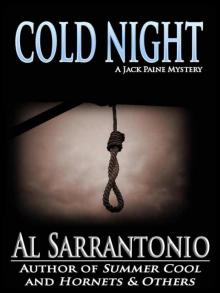 Cold Night (Jack Paine Mysteries)
Cold Night (Jack Paine Mysteries)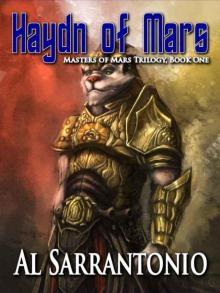 Haydn of Mars
Haydn of Mars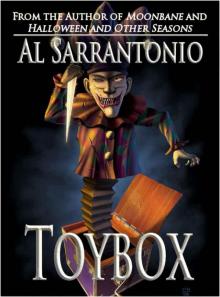 Toybox
Toybox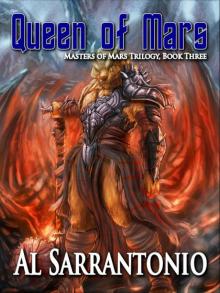 Queen of Mars - Book III in the Masters of Mars Trilogy
Queen of Mars - Book III in the Masters of Mars Trilogy Exile
Exile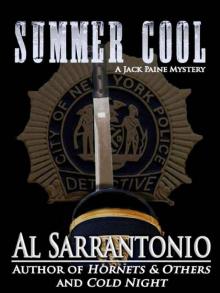 Summer Cool - A Jack Paine Mystery (Jack Paine Mysteries)
Summer Cool - A Jack Paine Mystery (Jack Paine Mysteries)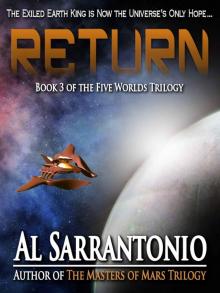 Return - Book III of the Five Worlds Trilogy
Return - Book III of the Five Worlds Trilogy The Orangefield Cycle Omnibus
The Orangefield Cycle Omnibus Summer Cool jp-2
Summer Cool jp-2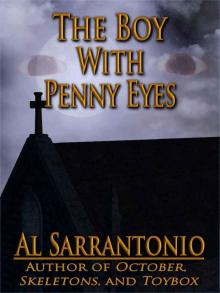 The Boy With Penny Eyes
The Boy With Penny Eyes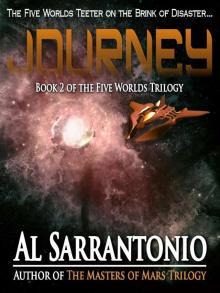 Journey - Book II of the Five Worlds Trilogy
Journey - Book II of the Five Worlds Trilogy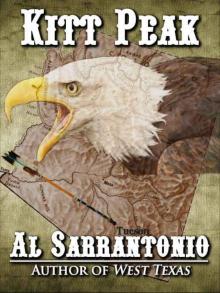 Kitt Peak
Kitt Peak Campbell Wood
Campbell Wood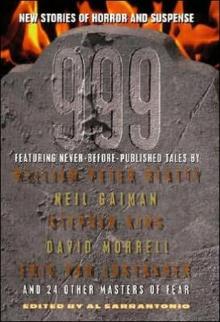 999
999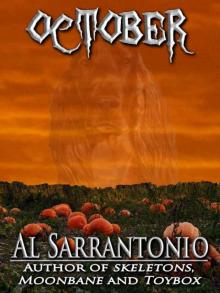 October
October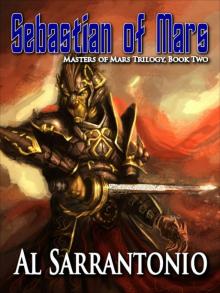 Sebastian of Mars
Sebastian of Mars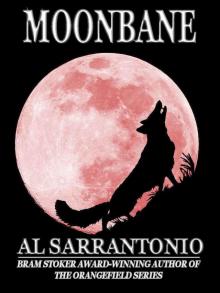 Moonbane
Moonbane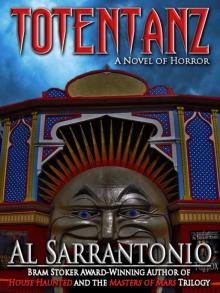 Totentanz
Totentanz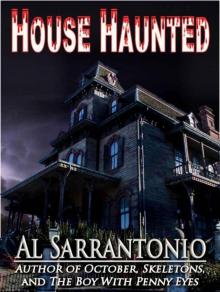 House Haunted
House Haunted Halloweenland
Halloweenland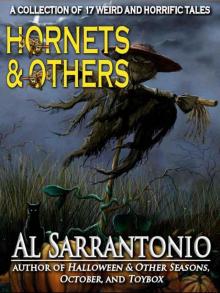 Hornets and Others
Hornets and Others